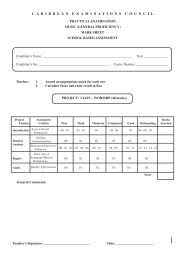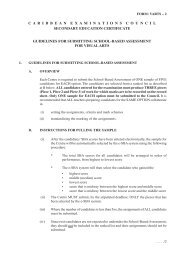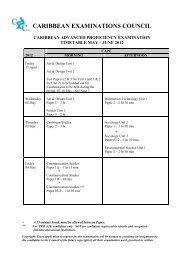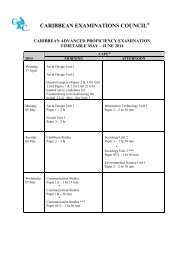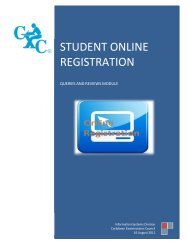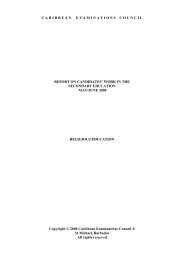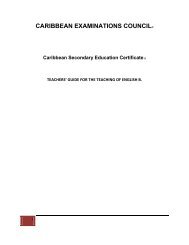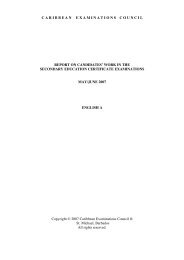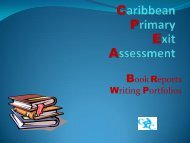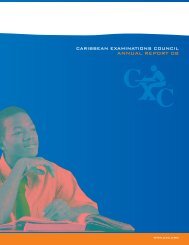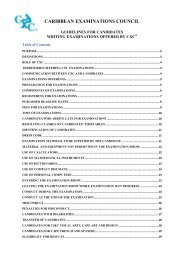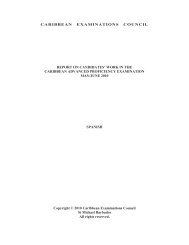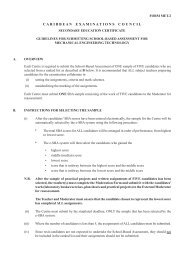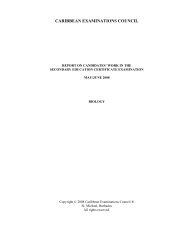CCSLC Modern Languages Syllabus - Caribbean Examinations ...
CCSLC Modern Languages Syllabus - Caribbean Examinations ...
CCSLC Modern Languages Syllabus - Caribbean Examinations ...
- No tags were found...
Create successful ePaper yourself
Turn your PDF publications into a flip-book with our unique Google optimized e-Paper software.
INTRODUCTION<strong>Caribbean</strong> Certificate of Secondary Level CompetenceThe <strong>Caribbean</strong> <strong>Examinations</strong> Council (CXC) in consultation with policy makers and educators in CXC Participating Territories identified the need for a new programme that would respond tothe changing demands of the education sector. A major development has been the move by all territories to universal secondary education which enables persons with a wide range ofabilities to benefit from educational provision at this level. The decision to implement programmes to achieve universal secondary education is based on an understanding that the regionneeds a well educated and trained labour force for an increasingly competitive global environment. A sound secondary education foundation is imperative for further education and trainingand for entry in the world of work.Several territories, having recognised the need for a programme that would meet the new needs in secondary education, had embarked on the development of national programmes.However, through consultations at the regional level, policy makers and educators recognised that a regional intervention by CXC would have several benefits including cost-effectiveness,common standards, portability of certification and regional and international recognition.CXC has responded. Through the consultative processes employed in syllabus development, <strong>CCSLC</strong> was developed and first examined in 2007. The programme which is competency-basedcomprises a core of subjects – English, Integrated Science, Mathematics, <strong>Modern</strong> <strong>Languages</strong> and Social Studies. Through this core, the learner should acquire the knowledge, skills,competencies, values and attitudes that are desired in a secondary school leaver. The core developed by CXC subject panels will be examined by CXC. In addition, learners can gain additionalbenefit through special programmes that may be added as electives to the core at national level.Policy makers and educators have noted that, ideally, this core programme could be taken by all students at the stage when they are ready. However, the decision on who should take theexamination and in what year it will be taken will be made at national level in consultation with CXC. A person who successfully completes this core should have the foundation for furthereducation and training and for entry level employment. In developing and implementing this programme at the secondary level, CXC, working with its partners, took into consideration thecultural context and the aspirations of regional governments for a well educated and trained labour force to meet the targets set for social and economic development as enshrined in theCARICOM document “The Ideal <strong>Caribbean</strong> Person (2000)”. The foundation that this programme will provide is an imperative as a base for the development of citizens as the most valuableresource of the small states of the region.The main focus of this programme is derived from the aspirations of regional governments and the <strong>Caribbean</strong> Community (CARICOM) which acknowledge that education is the route tohealthy democracies and sustainable development. The curriculum is therefore competency based and encompasses the knowledge, skills, attitudes, values and attributes expected of highschool graduates by regional Governments. Some of these knowledge, skills, attitudes, values and attributes or competencies are generic and cut across all five subjects, whilst others arepeculiar to each of the five subjects of the curriculum. The generic and subject specific competencies targeted for development in the curriculum are given below.The main focus of this programme is derived from the aspirations of regional governments and the <strong>Caribbean</strong> Community (CARICOM) which acknowledge that education is the route tohealthy democracies and sustainable development. The curriculum is therefore competency based and encompasses the knowledge, skills, attitudes, values and attributes expected of high<strong>CCSLC</strong>/ML/O4/12 i



